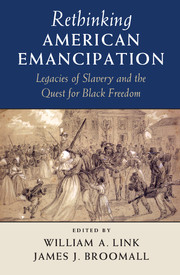Book contents
- Frontmatter
- Contents
- List of figures
- Notes on the Editors and Contributors
- Acknowledgments
- Introduction
- I CLAIMING EMANCIPATION
- II CONTESTING EMANCIPATION
- 4 “One Pillar of the Social Fabric May Still Stand Firm”: Border South Marriages in the Emancipation Era
- 5 Axes of Empire: Race, Region, and the “Greater Reconstruction” of Federal Authority after Emancipation
- 6 Fear of Reenslavement: Black Political Mobilization in Response to the Waning of Reconstruction
- III REMEMBERING EMANCIPATION
- Index
4 - “One Pillar of the Social Fabric May Still Stand Firm”: Border South Marriages in the Emancipation Era
from II - CONTESTING EMANCIPATION
Published online by Cambridge University Press: 05 November 2015
- Frontmatter
- Contents
- List of figures
- Notes on the Editors and Contributors
- Acknowledgments
- Introduction
- I CLAIMING EMANCIPATION
- II CONTESTING EMANCIPATION
- 4 “One Pillar of the Social Fabric May Still Stand Firm”: Border South Marriages in the Emancipation Era
- 5 Axes of Empire: Race, Region, and the “Greater Reconstruction” of Federal Authority after Emancipation
- 6 Fear of Reenslavement: Black Political Mobilization in Response to the Waning of Reconstruction
- III REMEMBERING EMANCIPATION
- Index
Summary
From the moment the first slaves took flight during the Civil War, the process of emancipation profoundly shook the core of traditional white Southern society. Throughout the antebellum slave South, law and custom reinforced a strictly hierarchal social structure, upholding elite white male authority over both social inferiors and household dependents. Many Southerners understood that slavery and gender roles within the household were irrevocably linked and that an attack upon one was an attack upon the other. By the 1860s, secession debates and Confederate rhetoric urged Southerners to defend their households, both black and white, as well as their way of life against northern attackers. Yet, by taking up arms to defend their homes, Southerners unintentionally brought about the end of the slave system and threatened the household itself. With the end of the war, both emancipation and divorce exposed the inherent dissolvability of social relationships, ultimately threatening to reveal white male authority as tenuous and unstable. If ties such as marriage were not obligatory but voluntary, how fixed could other social contracts be?
As slaves left plantations from Texas to Virginia, both slaveholding and non-slaveholding white Southerners reevaluated their gender roles within the home. With emancipation, the Southern household became a newly contested landscape, as white men and women struggled either to redefine their positions or maintain the social order that typified Southern life before the war. As this volume contends, however, black emancipation was a messy and uneven process, making its impact on the South's white population and their attempts to reorder or reclaim the household equally uneven. Analyzing the appellate and chancery divorce cases of one former border state and one former Confederate state in the immediate postwar years contributes to a more complete picture of this varied and complex process and demonstrates the pivotal role of place (specifically, border places) in emancipation's story. This chapter addresses the impact of emancipation on white marriages in Kentucky and Virginia during the first eight years following the Civil War, using this comparative approach to argue that emancipation's effect on Bluegrass gender roles was muted by the state's hybrid border culture and antebellum experiences.
- Type
- Chapter
- Information
- Rethinking American EmancipationLegacies of Slavery and the Quest for Black Freedom, pp. 93 - 118Publisher: Cambridge University PressPrint publication year: 2015

